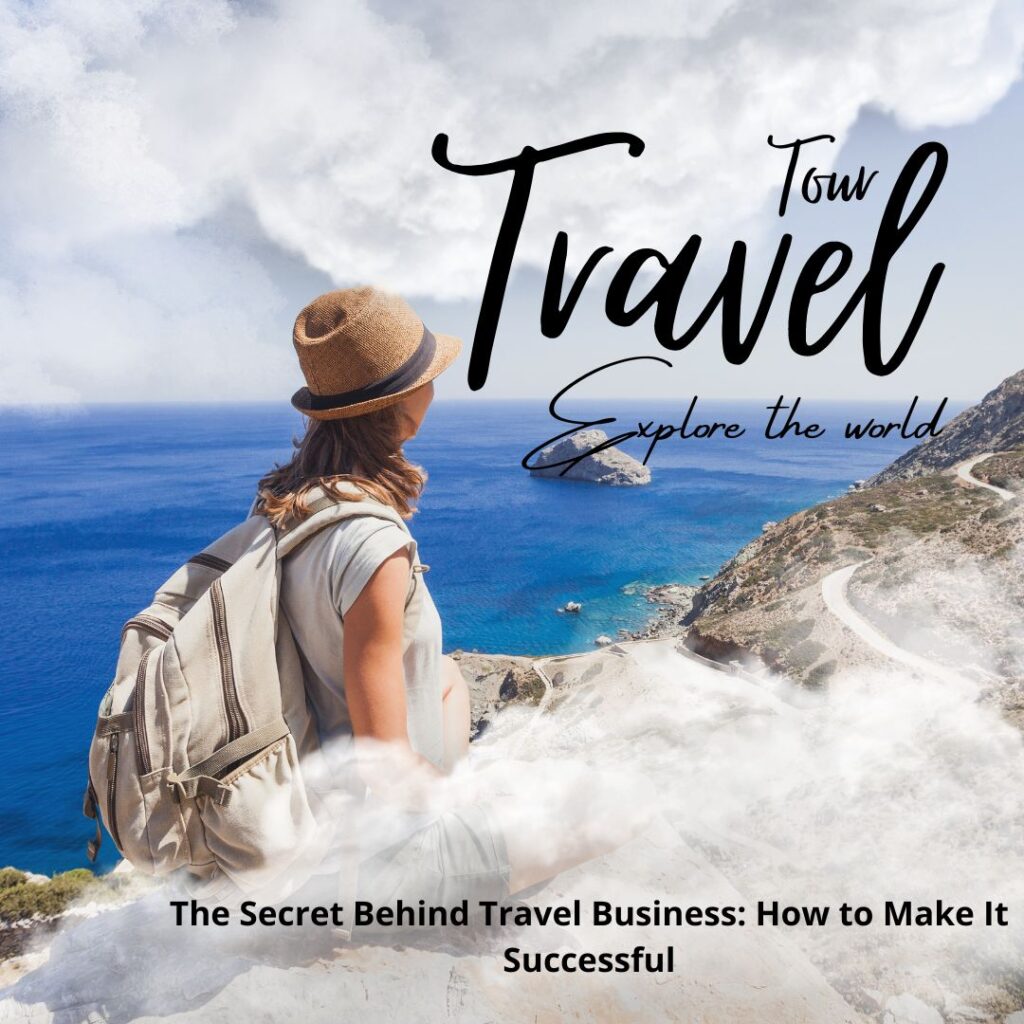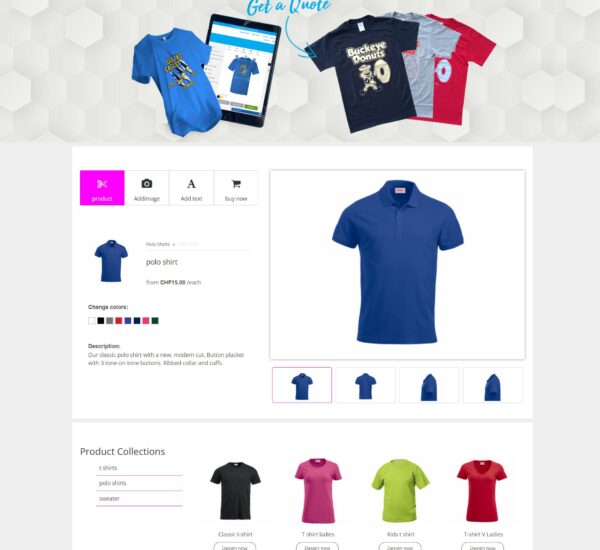Travel is one of the most popular and profitable industries in the world. According to the World Travel and Tourism Council, travel and tourism contributed $8.9 trillion to the global economy in 2019, accounting for 10.3% of global GDP and supporting 330 million jobs. However, travel is also one of the most competitive and challenging industries, especially in the wake of the COVID-19 pandemic that has disrupted travel demand and supply.
So, how can you start and run a successful travel business in this dynamic and uncertain environment? What are the secrets behind the success of some of the leading travel brands and entrepreneurs? In this post, we will share some tips and tricks for creating a unique and profitable travel business in 2023.

Tip 1: Find Your Niche
The first step to starting a successful travel business is to find your niche. A niche is a specific segment of the market that has a distinct need, preference, or problem that you can solve better than your competitors. Finding your niche will help you differentiate yourself from the crowd and attract loyal and profitable customers.
Some examples of travel niches are:
- Adventure travel: This niche caters to travelers who seek thrilling and challenging experiences, such as hiking, rafting, skiing, etc.
- Luxury travel: This niche caters to travelers who seek high-end and exclusive services, such as private jets, villas, spas, etc.
- Eco-travel: This niche caters to travelers who seek sustainable and responsible tourism practices, such as green hotels, wildlife conservation, etc.
- Wellness travel: This niche caters to travelers who seek health and wellness benefits, such as yoga retreats, meditation centers, etc.
- Solo travel: This niche caters to travelers who prefer to travel alone or with like-minded people, such as solo female travelers, digital nomads, etc.
To find your niche, you need to do some market research and identify:
Who are your target customers? What are their demographics, psychographics, behaviors, and pain points?
What are their needs, wants, expectations, and goals when it comes to travel?
How can you satisfy their needs better than your competitors? What are your unique value propositions and competitive advantages?
How big is your potential market? How much are your customers willing to pay for your products or services?
How can you reach your customers? What are the best channels and strategies to market your products or services?
Tip 2: Create Your Brand Identity
The second step to starting a successful travel business is to create your brand identity. A brand identity is the way you want your customers to perceive your business. It includes elements such as your name, logo, slogan, color scheme, font, tone of voice, etc.
Creating a strong brand identity will help you:
- Stand out from your competitors and attract your ideal customers
- Build trust and loyalty with your customers and increase your retention and referral rates
- Communicate your values and personality and create an emotional connection with your customers
- Enhance your reputation and credibility and increase your word-of-mouth and social media exposure
To create your brand identity, you need to:
- Define your brand vision: What is the purpose and mission of your business? What are the values and principles that guide your business? What are the goals and objectives that you want to achieve?
- Define your brand personality: How do you want your customers to feel when they interact with your business? What are the traits and characteristics that describe your business? How do you want to sound and look like?
- Define your brand positioning: How do you want to position yourself in the market? What are the benefits and features that you offer to your customers? How are you different and better than your competitors?
- Create your brand assets: How do you want to express your brand identity visually and verbally? What are the elements that you need to create, such as your name, logo, slogan, color scheme, font, tone of voice, etc.?
Tip 3: Build Your Online Presence
The third step to starting a successful travel business is to build your online presence. An online presence is the way you showcase your business on the internet. It includes elements such as your website, social media profiles, blog, email list, etc.
Building a strong online presence will help you:
- Increase your visibility and reach to potential customers who are searching for travel products or services online
- Showcase your products or services and demonstrate their value and quality to potential customers
- Educate and inform your potential customers about your niche, industry, and destination
- Engage and interact with your potential and existing customers and build relationships with them
- Generate leads and conversions and grow your sales and revenue
To build your online presence, you need to:
- Create a website: A website is the central hub of your online presence. It should be user-friendly, mobile-responsive, fast-loading, secure, and SEO-optimized. It should also include clear and compelling content that showcases your products or services, such as images, videos, testimonials, etc.
- Create social media profiles: Social media is a powerful tool to promote your business and connect with your audience. You should choose the platforms that best suit your niche and target market, such as Facebook, Instagram, Twitter, LinkedIn, etc. You should also post relevant and engaging content that showcases your brand personality, value proposition, products or services, etc.
- Create a blog: A blog is a great way to provide valuable and informative content to your audience. You can write about topics related to your niche, industry, and destination, such as tips, guides, reviews, stories, etc. You can also use your blog to showcase your expertise and authority and to drive traffic to your website and social media profiles.
- Create an email list: An email list is a list of contacts who have given you permission to send them emails. You can use email marketing to communicate with your audience and nurture them through the sales funnel. You can also use email marketing to provide exclusive offers, discounts, updates, newsletters, etc.
Tip 4: Partner with Other Travel Businesses
The fourth step to starting a successful travel business is to partner with other travel businesses. Partnering with other travel businesses can help you expand your network, reach, and offerings. You can also leverage the expertise, resources, and reputation of your partners to enhance your own business.
Some examples of travel businesses that you can partner with are:
- Travel suppliers: These are the businesses that provide the core travel products or services, such as airlines, hotels, car rentals, tour operators, etc. You can partner with them to get access to their inventory, rates, and commissions. You can also negotiate better deals and discounts for your customers.
- Travel agents: These are the businesses that act as intermediaries between travel suppliers and travelers. They help travelers plan and book their trips according to their needs and preferences. You can partner with them to get referrals, leads, and bookings. You can also offer them incentives and commissions for promoting your products or services.
- Travel influencers: These are the individuals who have a large and engaged following on social media or other online platforms. They create and share content related to travel, such as photos, videos, blogs, podcasts, etc. You can partner with them to get exposure, awareness, and trust for your brand. You can also offer them free or discounted products or services in exchange for their honest reviews or recommendations.
Do you need Online Business help? Contact for SEO, Website Design, Google Ads & Application Development.
Tip 5: Provide Excellent Customer Service
The fifth and final step to starting a successful travel business is to provide excellent customer service. Customer service is the way you interact with your customers before, during, and after their trips. It includes elements such as communication, responsiveness, problem-solving, feedback, and follow-up.
Providing excellent customer service will help you:
- Satisfy and delight your customers and exceed their expectations
- Build trust and loyalty with your customers and increase your retention and referral rates
- Enhance your reputation and credibility and increase your word-of-mouth and social media exposure
- Identify and resolve any issues or complaints and prevent negative reviews or feedback
- Learn from your customers and improve your products or services
To provide excellent customer service, you need to:
- Communicate clearly and effectively with your customers and keep them informed of their travel details, such as confirmations, reminders, updates, etc.
- Respond quickly and politely to your customers’ inquiries, requests, or concerns and provide them with accurate and helpful information
- Solve any problems or issues that your customers may face during their trips and offer them solutions or alternatives
- Ask for feedback from your customers and listen to their opinions and suggestions
- Follow up with your customers after their trips and thank them for their business
Conclusion
Travel is a lucrative and exciting industry that offers many opportunities for entrepreneurs who are passionate about travel. However, it also requires a lot of planning, preparation, and hard work. By following the tips and tricks in this post, you can start and run a successful travel business in 2023. We hope this post has inspired you to pursue your travel business dreams.
Content by: Mypuritour – Puri Package Tour & Holidays







